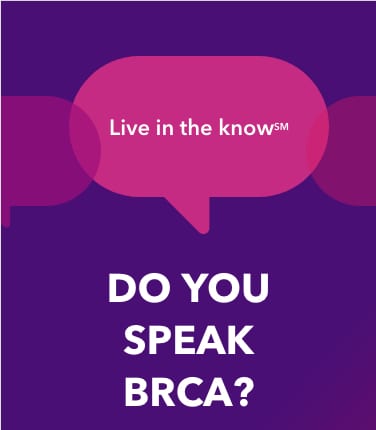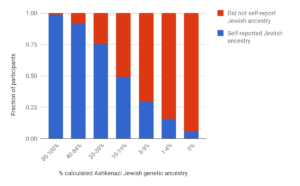For Breast Cancer Awareness Month, we wanted to shed some light on something you might not know. Studies suggest that 
Current guidelines recommend BRCA genetic testing for people with a personal or family history of certain cancers.
In addition, Ashkenazi Jewish ancestry is sometimes considered in testing decisions as well. The U.S. Preventive Services Task Force recently highlighted Ashkenazi Jewish ancestry as a factor for consideration. However, this recommendation requires that people know their ancestry, and many don’t.
Awareness of Askenazi Ancestry & Cancer History
In 2018, 23andMe began offering a BRCA1/BRCA2 (Selected Variants) Genetic Health Risk report.* The report tests for three BRCA variants that are most common in people of Ashkenazi Jewish descent. It was the first direct-to-consumer genetic health risk test for cancer with FDA authorization.
After the authorization, our scientists studied data from more than 2,800 23andMe customers who consented to participate in research and also carry one or more of the three BRCA1 or BRCA2 variants analyzed in 23andMe’s BRCA1/BRCA2 (Selected Variants) report.
The 23andMe scientists focused on the two criteria often used to recommend healthy individuals for BRCA genetic testing: Ashkenazi Jewish ancestry and family cancer history. Their study found that among those with one or more of the BRCA1/BRCA2 variants that 23andMe tests for:
- 21 percent reported no Jewish ancestry, but more than half of those individuals — 62 percent — actually have detectable Ashkenazi genetic ancestry.
- 44 percent did not report having a first-degree family history of BRCA-related cancer — breast, ovarian, prostate or pancreatic cancer.
“In the absence of a personal history of cancer, these are individuals who would be unlikely to qualify for clinical genetic testing,” said 23andMe Health Product Scientist Ruth Tennen, Ph.D., who was the lead author of the study. “Our findings lend support for the growing call for broader access to BRCA genetic testing.”
Slipping through the Cracks
These findings — that almost half of the carriers of a BRCA risk variant who provided family history information reported no family history of a BRCA-related cancer — are consistent with other studies. All have shown that many carriers of these high-risk variants would fall through the cracks of traditional BRCA testing guidelines. The findings also suggest that many of the 2,800 23andMe research participants in this study may not have learned about their BRCA status if they had not had access to their 23andMe report.
The three BRCA1 and BRCA2 variants in 23andMe’s report are known as Ashkenazi founder variants, and are most common in people of Ashkenazi Jewish descent. But the three variants are associated with increased cancer risk no matter your ancestry. Women with one of these variants have a 45-85 percent chance of developing breast cancer and up to a 46 percent chance of developing ovarian cancer by age 70.
23andMe’s Report
It’s important to note that 23andMe’s BRCA1/BRCA2 (Selected Variants) report looks at just three out of more than 1,000 BRCA variants associated with an increased risk for cancer.
So if you have a personal or family history of cancer, it’s important to talk to a healthcare professional about whether comprehensive genetic testing may be right for you.
23andMe’s BRCA1/BRCA2 (Selected Variants) report also is not diagnostic. It can’t tell you whether or not you’ll develop cancer. But it can alert you to a potential genetic risk that you might not have known of otherwise. The BRCA1/BRCA2 (Selected Variants) report is part of a broad direct-to-consumer DNA test that includes more than a dozen reports on Genetic Health Risks,* more than 40 Carrier Status Reports*, more than 30 Trait Reports, as well as 5+ Wellness Reports, and reports on an individual’s genetic ancestry.
Unexpected Findings
A few years ago, 23andMe studied how people react to unexpected BRCA findings. Our researchers found that those who learned they had a risk variant generally took appropriate action, talking to their doctors and sharing their results with family members, who also might not have known about the family’s potential risk for hereditary cancer.
Want to learn more about 23andMe’s BRCA1/BRCA2 (Selected Variants) report or simply want to learn a little more about the BRCA genes and their association with cancer?
Check out the “Do You Speak BRCA?” page.
**The 23andMe PGS test includes health predisposition and carrier status reports. Health predisposition reports include both reports that meet FDA requirements for genetic health risks and the 23andMe Type 2 Diabetes health predisposition report which is based on 23andMe research and has not been reviewed by the FDA. The test uses qualitative genotyping to detect select clinically relevant variants in the genomic DNA of adults from saliva for the purpose of reporting and interpreting genetic health risks and reporting carrier status. It is not intended to diagnose any disease. Your ethnicity may affect the relevance of each report and how your genetic health risk results are interpreted. Each genetic health risk report describes if a person has variants associated with a higher risk of developing a disease, but does not describe a person’s overall risk of developing the disease. The test is not intended to tell you anything about your current state of health, or to be used to make medical decisions, including whether or not you should take a medication, how much of a medication you should take, or determine any treatment. Our carrier status reports can be used to determine carrier status, but cannot determine if you have two copies of any genetic variant. These carrier reports are not intended to tell you anything about your risk for developing a disease in the future, the health of your fetus, or your newborn child’s risk of developing a particular disease later in life. For certain conditions, we provide a single report that includes information on both carrier status and genetic health risk. Warnings & Limitations: The 23andMe PGS Genetic Health Risk Report for BRCA1/BRCA2 (Selected Variants) is indicated for reporting of the 185delAG and 5382insC variants in the BRCA1 gene and the 6174delT variant in the BRCA2 gene. The report describes if a woman is at increased risk of developing breast and ovarian cancer, and if a man is at increased risk of developing breast cancer or may be at increased risk of developing prostate cancer. The three variants included in this report are most common in people of Ashkenazi Jewish descent and do not represent the majority of BRCA1/BRCA2 variants in the general population. This report does not include variants in other genes linked to hereditary cancers and the absence of variants included in this report does not rule out the presence of other genetic variants that may impact cancer risk. The PGS test is not a substitute for visits to a healthcare professional for recommended screenings or appropriate follow-up. Results should be confirmed in a clinical setting before taking any medical action. For important information and limitations regarding each genetic health risk and carrier status report, visit 23andme.com/test-info/
__________________________




